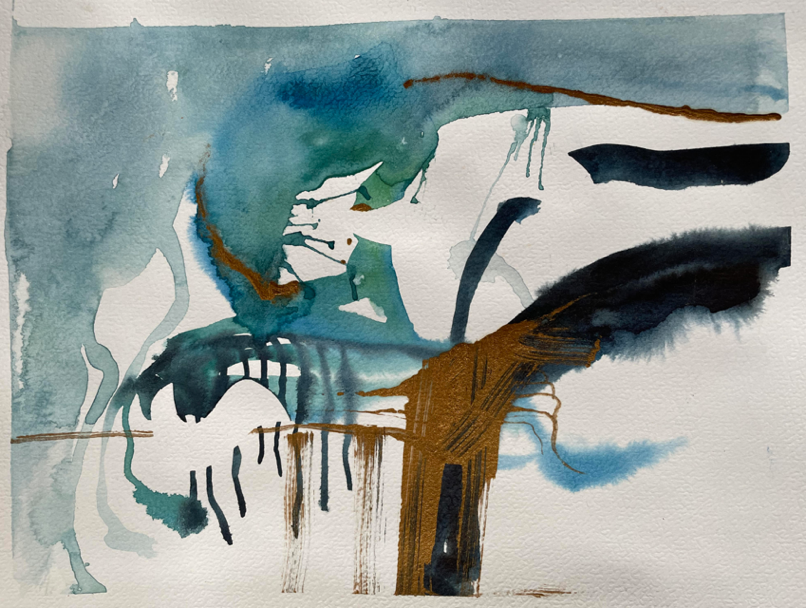
Zuzanna Szmyt-Nowakowska
Lumbricus Terrestris. Earthworm. Nightcrawler. Why is the simple shiny earthworm called a night-crawler? Does it literally crawl in the night? Or is the night the symbol of it living physically, mostly in the dark? It strikes me that in my childhood memories these particular worms were subjected to the most appalling forms of torture imaginable, inflicted by the sheer arrogance and cruelty of my older brother and his friends. They would dig the poor worms out of the ground in my grandmother’s little garden plot where she grew petunias and gladioli, and where, in the early spring, you could find crocuses and snowdrops. Early summer would be the time for the lily-of-the-valley and lilacs to spread their intoxicating smell everywhere around the house entrance. In autumn, we would pick quince to have something to enjoy in a mug of steaming winter tea when the little garden plot was covered in thick snow. After grandma died my parents uprooted the quince and, in my mind, it became a symbol of the end—as if my granny’s spirit had been lifted off the face of the Earth.
* * *
To this day, I still don’t know what happened to those earthworms in the winter. But I hope they managed to hide deep underground, safe from the vicious, outside world. What I knew for sure, though, was what happened to those poor, hard-working creatures when my brother and his friends dug them up. I vividly remember their fascination with the endurance of each worm as it was cut into pieces without much consideration. “It doesn’t have feelings, you know?” is what they always used to tell me when I looked at them with dread in my eyes. I soon realized that in its apparent simplicity, the earthworm is more resilient than any human being would ever dream of becoming. Even though it’s an organism that thrives on being segmented, cutting a worm into pieces has never felt right to me. Who am I or my brother to intervene in this creature’s life? From what my grandma taught me, earthworms are extremely important in the process of soil fertilization. The soil they inhabit is for them what a placenta would be to a fetus. And yet, my brother felt no remorse in tearing them out of their womb. Their safe place.
* * *
Perhaps this is where my distrust of people stems from. From the sadistic tendencies of people who are faced with an opportunity to hurt helpless creatures. To hurt those who don’t have the strength or ability to fend for themselves. “It-selves”. From this sense of entitlement to be violent towards the defenseless.
***
My grandma was a Jehovah’s Witness. This never appeared to me as something strange or socially unacceptable, and I simply went on living my oblivious life. To me, she was just a good person with no vile intentions, who made the best dumplings in the world and who, for a short while, convinced me that after we all die there would be heaven on Earth. Those who lived a lawful life and did no harm to others would be reborn; pain, illness and suffering would vanish. I had nothing else to believe in, as my parents didn’t want me baptized or sanitized with any other sacraments. I had never been “programed” into believing anything else, which was fine until I started primary school, and my peers started asking questions.
It was only around a decade later when I learned that my parents, my dad being a Jehovah’s Witness and my mum being Catholic, had had to come to the decision that, for them to stay together, they’d have to skirt round their beliefs. Against all odds—they did, and as a result they never drummed into our heads any specific religiosity. In the end, the most difficult part of being “different” from anyone else at school was the bullying. That was when I started to feel like a defenseless earthworm: people picking on me and tearing me out of my blissful ignorance, cutting me into small pieces with their hurtful comments. I learned the hard way that entitlement exists, and that it can be extremely easy to fall into the role of victim, as easy as ripening into the perpetrator. The idea that hopefully one day I’d be somehow rewarded for not becoming the latter kept me resilient.
More years needed to pass for me to learn that what other people thought they knew about Jehovah’s Witnesses and, by extension, about me, was a muddle of stigmas and stereotypes. Before I shed any urge to seek other people’s acceptance (especially those who had already labelled me), I had gone on my personal little crusade to somehow redeem my reputation and pass for a “normal” person. I rejected the only faith I knew but it didn’t help much: most people still assumed that I was just another “knock-on-the-door” crazy child. The stigmatization eventually led me to stop talking about or embracing any of my views. It made me want to crawl into the soil like earthworms do. The hurt made me seek the comfort of winter, sleep, and shelter. I felt cut to pieces.
***
I think that these experiences are what has shaped me into the person I am today—a cliché, but I strongly believe that being picked apart because of a supposed otherness has marked me out in life. And I have learned only recently to live with myself and not let people cut me into pieces anymore.